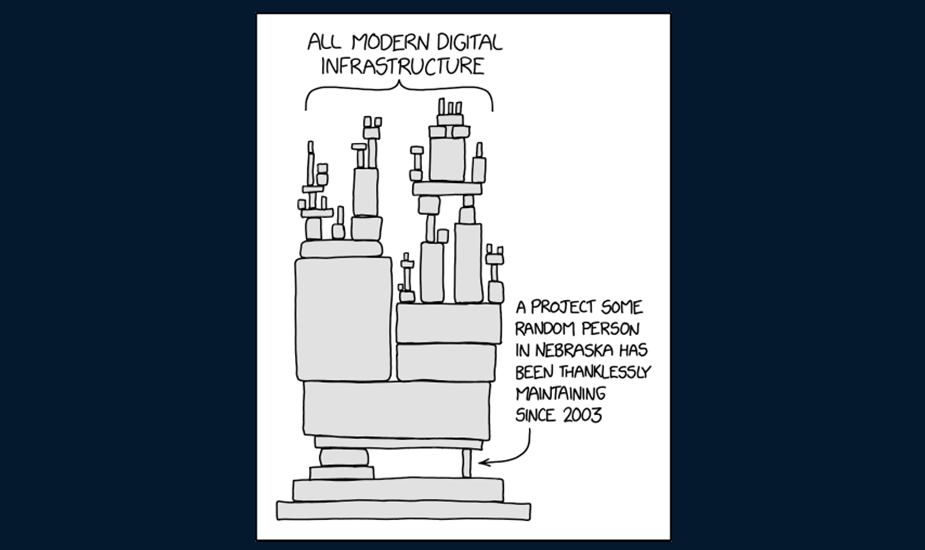
"Dependency" by XKCD (which if you aren't following regularly, you should!) https://xkcd.com/2347/ (CC BY-NC 2.5)
Program Goal
To develop tools, norms, and institutions that take full advantage of open source practices to support the distributed development, adoption, and maintenance of discovery-enabling software, hardware, and models.
Strategy
Once viewed as primarily a licensing strategy, open source has become increasingly established as a set of practices that facilitate distributed collaboration. To fully realize the potential of innovations like data science, computational modeling, novel instrumentation, and machine learning, this program aims to adapt and extend best practices in open source into academic technology development while recognizing the unique workflows and incentives of scientific research. Rather than funding individual open source development projects, grants in this area focus mainly on tooling, institutions, economic models, and incentives around the production, maintenance, and adoption of research software, hardware, models, and other related research outputs.
Focus Areas
Current areas of focus include:
Institutional Support for Open Source
While scientific discovery usually happens within universities and independent research labs, most don’t incentivize or resource critical open source work. In industry, a growing awareness of the value of open source led to the creation of Open Source Program Offices and other mechanisms to directly support open source practices. Though academic institutions have very different priorities than companies, they can learn from such models and adapt them to the unique context of scientific research. We seek to support understanding of best practices in open source by the research enterprise, with a particular eye toward building institutional capacity and alignment with academic incentives.
Publication & Archiving
Healthy open source projects rely on clear documentation and communication. Scientific software, however, is all too often uncited, poorly archived, difficult to reuse, and poorly integrated into the scholarly communication system. Lack of clarity about who contributes to or uses a given project distorts incentives and inhibits the re-use and maintenance of open source scientific software. This program seeks opportunities to elevate software as a first-order research product as well as efforts that aim to improve code review and the linkages between software and other research outputs, such as articles, preprints, or data.
Roles & Career Paths
The work of building and maintaining research software is often undervalued and marginalized in the research enterprise. This program seeks opportunities to foreground and institutionalize the individuals, communities, and emerging technologies that build and steward scientific software, with particular attention to the roles of research software engineer, data scientist, software curator, and other staffing models of importance to open source scientific software. In addition, at a time when AI and other automation tools are likely to reshape the division of labor engaged in such work, this program aims to develop optimal models for human-AI collaboration in scientific software practices.
Resources
-
Sign up for the Tech program newsletter!
A periodic compilation of grantee news, project updates, interesting links, and things we're reading and thinking about.
Subscribe -
Supported platforms
Platforms, protocols, and products supported through the Foundation's grantmaking
Learn more -
Reporting Guidelines
Content and formatting requirements for program grantees for the submission of interim and final grant reports
Read more
Apply
Interested grantseekers should send a two-page letter of inquiry to [email protected].